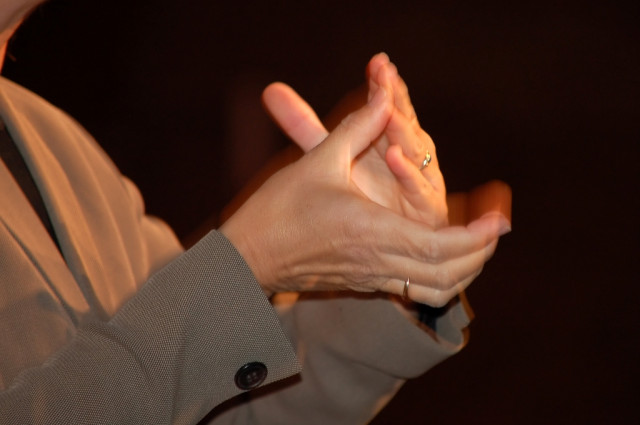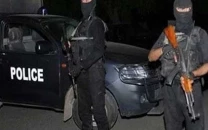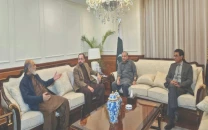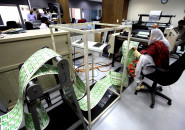A sign of the times: Deaf Reach schools say it all with dedication and sheer grit
Students and families learn sign language and get help finding jobs.

Richard Geary has been in Karachi for 24 years, helping children born with a hearing disabilities become self sufficient and active members of society with the help of his family and friends.
Since 1984, the Family Education Services Foundation (FESF) network he founded has spread to Lahore, Hyderabad and Sukkur while two more schools are being built in Benazirabad and Rashidabad.
FESF was the first organisation in the country to be set up especially for children with hearing disabilities. Primary campus of Deaf Reach is nestled among commercial offices, houses and other schools and institutes in PECHS. Its dull grey building and neatly mowed lawn stands out in stark contrast to the bright and cheerful ambiance of the classrooms.
Riffat Ashfaq looks over the shoulder of one of the children as he writes his lesson. She comes here every day with her two children to receive training to teach in sign language.
Riffat says that she was the only one in her family with a hearing disability. She got married around 10 years ago and it was only after she had her first child that she began to learn to read and write. Riffat’s husband, like her, cannot hear. He works as a tailor and draper and runs his own shop in Saddar. “My husband encouraged me to study and I did my BA from Ida Rieu School.” Besides educating children with hearing disabilities, FESF also conducts sign-language training sessions for their parents. “The foundation focuses on a holistic approach to education. We want to empower these people,” explains Maria Paola, the co-founder. “We not only want the children to learn to read and write, we also want them to become an active part of society.”
Paola says that since the school environment is very different from that of a home, the new students first join a special induction class to acclimatise them to school and its environment. Once they have become used to the routine and the teachers gauge the student’s potential, they are moved to a group with children of their age or the learning standard. “For a child who cannot hear, when he walks into a room where everyone is talking in full sentences and communicating, it’s a Eureka moment,” says Geary with a smile on his face.
The teacher for the induction class, Faiz Rasool, has come from Gilgit. “I have a daughter who could not hear by birth,” he said with a touch of sadness in his voice. “I tried to find a school for her there but there weren’t any that would take her. Then I bought her here.” His voice gradually fills with hope and determination as he goes on to explain that once he has finished his training, he will go back and open a school for children like his daughter.
The primary branch has around 120 students. The cost of education for each child comes around Rs5,000 per month, including transport, snacks and learning aides. But since most of them cannot afford to pay the fee it is usually waived or slashed drastically. “Some of the parents pay us only Rs150 a month because that is only what they can spare.”
The secondary campus of Deaf Reach offers a variety of courses. Students are taught home economics, computers, stitching and embroidery and art. It also works with the Benazir Income Support Programme and inducts a batch of students every year in Sukkur, Hyderabad and Karachi for these courses.
FESF not only works to educate students but also aims to help them find jobs. This is why it encourages its students to work for its schools and also arranged different projects with multi-national organisations for job placements. In all of the FESF schools across Sindh and Lahore, there are around 72 teachers in total and out of them 45 are its own graduates.
Another example is of a project with KFC that opened a franchise at University Road, near Nipa, where all the staff are former students of Deaf Reach schools. FESF is working with Shell Pakistan and currently around 35 boys are working at petrol stations across Karachi.
“If you step back and see the people who cannot hear as a cultural minority group who share a common language rather than as people with a disability,” says Geary, “you get a whole different view. They simply need empowerment to reach their full potential.”
Published in The Express Tribune, May 20th, 2012.



















COMMENTS
Comments are moderated and generally will be posted if they are on-topic and not abusive.
For more information, please see our Comments FAQ